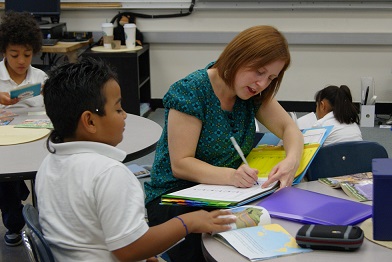Practicing Feedback
Join Our Community
Access this resource now. Get up to three resources every month for free.
Choose from thousands of articles, lessons, guides, videos, and printables.
 Feedback is a part of everyday life. At home, after a late night of homework, parents may explain to their child the need to do homework right after school, communicating priorities in an effort to avoid another late night. At work, after observing a whole-group comprehension lesson, a literacy coach may meet with a teacher, offering strategies to enhance instruction. At school, when conferring with a child on their use of a reading strategy, a teacher will provide effective feedback to enhance learning and change behaviors. Providing meaningful feedback creates a path for continued learning and growth, which leads to improved student achievement.
Feedback is a part of everyday life. At home, after a late night of homework, parents may explain to their child the need to do homework right after school, communicating priorities in an effort to avoid another late night. At work, after observing a whole-group comprehension lesson, a literacy coach may meet with a teacher, offering strategies to enhance instruction. At school, when conferring with a child on their use of a reading strategy, a teacher will provide effective feedback to enhance learning and change behaviors. Providing meaningful feedback creates a path for continued learning and growth, which leads to improved student achievement.
“Good job” and “try harder” are not examples of effective feedback. There is no guidance provided to help a person improve or to know what they are doing correctly. I attended a workshop last month where Rick Wormeli said, “Feedback should not provide judgment about quality; it should only provide comments on their decisions.” He suggested practicing by completing the following statement, “I noticed______________, and as a result____________.”
Understanding that the process of good feedback takes practice, he asked us to try it then and there with his presentation for the day. It was eye-opening how many professionals struggled to complete that statement with effective, meaningful feedback. Most could complete the first part of the statement: “I noticed _________.” but when it came to the second half, they were unsure. After collegial conversations and guidance from Rick, the process became simpler. Here are some examples:
- I noticed that as a presenter you added humor to your presentation every 10 minutes, and as a result I was not fidgety and was engaged throughout.
- I noticed that as a presenter you provided research to back your claims, and as a result I found more support in your statements and was more open to change.
- I noticed that as a presenter you called on some participants when they did not have their hand up, and as a result I was nervous because I did not want to be called on.
All of these statements provide feedback on his decisions as a presenter and are things he can either enhance or change.
Since attending his workshop I am more aware of the feedback I provide at home, work, and school and practice it daily. Try practicing your feedback today and see the influence it has on your students' learning.





